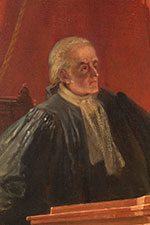
Judge Hall Detail from:
Christian Schussele (1824-1879)
Andrew Jackson Before Judge Hall (New Orleans) 1859
Oil on canvas
Framed: 57 1/4 x 74 1/4 x 5 1/2 in. (145.4 x 188.6 x 14 cm)
GM 0126.2023
Gilcrease Museum, Tulsa, Oklahoma
Dominic Augustin Hall was the first federal trial judge in the history of Louisiana. Judge Hall had the historically unique distinction of having been nominated to essentially the same judgeship on four separate occasions by two different presidents due to his court's legislative abolition and reconstitution in the early days of its establishment.
Judge Hall was born on January 1, 1765, in Charleston, South Carolina. He earned a degree at the College of Philadelphia, later known as the University of the State of Pennsylvania, in 1785. He entered private law practice in Charleston in 1789. On July 1, 1801, President Thomas Jefferson appointed him to a new seat on the United States Circuit Court for the Fifth Circuit. He was confirmed by the Senate and received his commission on January 26, 1802, but his service ended on July 1, 1802, when the court was abolished. President Jefferson then appointed him territorial federal judge for the "District of Orleans." He received his commission on December 11, 1804, and served until that court was abolished on April 30, 1812, when Louisiana became a State.
On May 27, 1812, President James Madison nominated him to be United States District Judge for the new District of Louisiana. He received his commission on June 1, 1812, but resigned on February 22, 1813, to accept appointment by Louisiana Governor William C. C. Claiborne to become a judge of the Louisiana Supreme Court. In the appointment papers, Claiborne noted his special trust and confidence in the patriotism, integrity, and abilities of Judge Hall, who served on the Louisiana Supreme Court only until the following May, when he resigned to resume his place on the federal bench. On May 29, 1813, he was again nominated by President Madison to fill the same seat he had previously left. He was confirmed by the Senate, received his final commission on June 1, 1813, and served until December 19, 1820, when he died in New Orleans.
Judge Hall presided over cases involving two of the most influential people of his time. In 1811, Edward Livingston, who later was Andrew Jackson's aide at the Battle of New Orleans, a Louisiana Congressman, and United States Secretary of State, sued former President Jefferson for damages stemming from an executive order expropriating Livingston's New Orleans batture property. After the case was dismissed for lack of jurisdiction, Livingston sued the United States Marshal in Judge Hall's court in New Orleans. Judge Hall entered judgment for Livingston, ordering the marshal to put the plaintiff "in the peaceable and quiet possession of the premises."
In 1815, when General Jackson declared martial law after the Battle of New Orleans, he had Judge Hall arrested by his troops and jailed for one night, after Judge Hall ordered the release of a Louisiana legislator whom Jackson had jailed for sedition. Judge Hall subsequently cited General Jackson for contempt of court, found the General guilty, and fined Jackson $1,000, which the General promptly paid. Congress refunded the fine to Jackson with interest in 1844.
